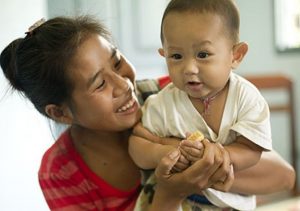MOMCare provided collaborative depression care for women who were depressed during pregnancy and was tested in a randomized, controlled trial in 10 public health centers of the public health system of Seattle-King County. This study was funded by the Horizons Foundation in Seattle and by a large 5-year grant from the National Institute of Mental Health.
The women were randomly assigned to either an 18-month MOMCare intervention or to public health Maternity Support Services, where they received a referral for depression care in the community or from their OB provider.
Results showed that MOMCare was more effective than MSS, especially for women with major depression and PTSD:
- Better engagement in an initial treatment session
- More improvement in depressive symptoms before and after the birth
- More improvement in work and social functioning before and after the birth
- More improvement in PTSD symptoms before and after the birth
- Better at preventing postpartum depression in women with adverse birth events (i.e., preterm birth, NICU placement)
- Better treatment adherence
- Greater satisfaction with depression care
 MOMCare is easily integrated into public health and OB/GYN settings. Women with difficult-to-treat depression (comorbid PTSD) were shown to benefit the most. The intervention can be implemented at modest cost — $2.50 a day for 18 months, less than a tall caffe latte.
MOMCare is easily integrated into public health and OB/GYN settings. Women with difficult-to-treat depression (comorbid PTSD) were shown to benefit the most. The intervention can be implemented at modest cost — $2.50 a day for 18 months, less than a tall caffe latte.
Study Components
The women in the study:
- were on Medicaid
- were racially and ethnically diverse (58%)
- two-thirds also had comorbid post-traumatic stress disorder (PTSD)
Comorbidity or having an additional psychological disorder is associated with worse health outcomes, more complex clinical management, and increased health care costs.
To be eligible for the study, women 18 years and older had to:
- screen positive for major depression and/or dysthymia (chronically depressed mood)
- speak English
- have telephone access
 Exclusionary criteria included multiple suicide attempts, lifetime schizophrenia or bipolar disorder, active substance abuse or addiction, severe domestic violence, or currently seeing a psychiatrist.
Exclusionary criteria included multiple suicide attempts, lifetime schizophrenia or bipolar disorder, active substance abuse or addiction, severe domestic violence, or currently seeing a psychiatrist.
Women randomized to Maternity Support Services (MSS) received education about depression from their MSS social worker and were referred for psychotherapy and/or anti-depressant medication from either their community mental health provider or their obstetrics provider.
MOMCare treatment consisted of:
- an initial engagement session which provided education about depression and addressed practical, psychological, and cultural barriers to depression care
- behavioral activation to increase positive or pleasurable activities the patient had stopped due to depression
- case management activities to meet basic needs (e.g., food security, safe housing, baby supplies, job training, etc.)
- a patient choice of Brief Interpersonal Psychotherapy, an evidence-based depression treatment and/or anti-depressant medication
- patient contact (in person or phone) by the depression care specialist every 1-2 weeks before birth and biweekly or monthly after birth up to one-year postpartum
- careful and consistent monitoring of treatment response with appropriate adjustments of treatment (increase dose of psychotherapy and/or augment with anti-depressant medication)
Baseline data were collected on 164 participants, with follow-up assessments at 3, 6, 12, and 18 months after enrollment. The primary outcomes for change were depression severity and functioning. There were no demographic differences between the MOMCare group and the Maternity Support Services group.
- 27 years old, on average
- 71% were unmarried
- 58% were of racial/ethnic minority
- 22% had no high school degree
- 65% were unemployed
- 42% had annual household income <$10,000
- 72% had an unplanned pregnancy
- 80% had recurrent depression
- 52% experienced childhood trauma
Participant Perspectives:
“Then I was just really depressed, and kinda like down in the dumps all the time. And now I’m happy, I’m working, I have stuff to do. I can take care of my baby now.”
“That’s what I learned so much is how to take care of myself. I always [took] care of…everybody else. Except myself.”
“That’s what [my depression care specialist] taught me is not put so much energy into the bad things that are going on, because it’s going to make me keep getting upset and more depressed. But, instead, I just move myself away right then.…”
“MOMCare helped me have more confidence, and being able to speak up for myself more.”
